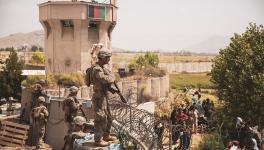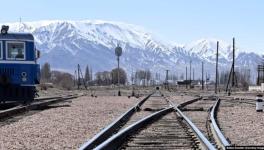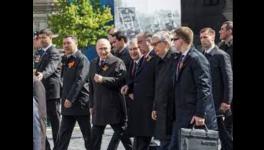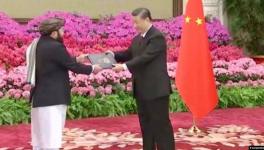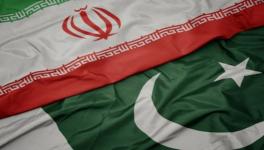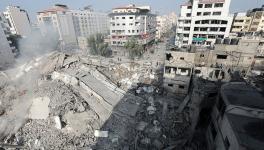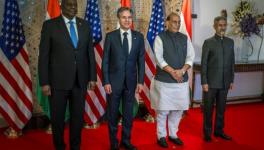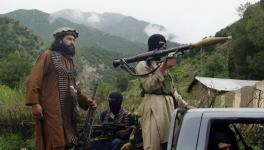It’s a Long Wait for Justice in Afghanistan’s Khost
Darkness slowly engulfed the surroundings when the nearby mosque’s muezzin (the person who proclaims the call to the daily prayer five times a day at a mosque) called for the Maghreb prayer. There is a field a few yards away from Rahmanullah’s home, vast in length but not very wide. Here, his young son played football and cricket during the day. One part of the field is a graveyard with over a hundred graves. On the right side of the field, there is a lush green field with wheat crops and apple orchards. A little further down, there is Mangal Road, one of the busiest roads in Khost City.
It was the 29th Ramadan last year when Rahmanullah’s son and his friends were bursting fire crackers in anticipation of Eid the next day. That was the last time Rahmanullah’s family saw their son alive.
Remembering that evening makes his eyes go moist and voice crack. “KPF (Khost Protection Force) militia were travelling by Mangal Road in an armoured truck, and we don't know exactly if they shot him from the road or from the field,” he said recalling the day. Rahmanullah’s younger brother, who was at home at the time, heard a bang. Then he heard the screams of the boy’s friends. He ran toward the screaming children and found Rahmanullah’s son in a pool of blood. The doctor later said that a bullet had pierced the boy’s heart.
The joy of Eid was stained by blood and tears. The usually boisterous boy’s body lay wrapped in white the next morning. Just a day before, all he could talk about was what gift he wanted on Eid. He wanted to buy a new cricket set from the Eidi (gift, often in the form of cash given to children by older members of home) he would have received. Rahmanullah’s family spent the day in mourning and funeral ceremonies.
The graveyard in the field where the young boy would sometimes go to collect his cricket balls is now his resting place.
Rahmanullah’s son was murdered by the militia of the KPF. Operating mainly in the south-eastern province of Khost as a ‘campaign force’, or counter-terrorism pursuit team, KPF was one of the many Afghan paramilitary forces or hitmen created by the Central Intelligence Agency (CIA) after the US invasion of Afghanistan to fight those have ties with Al Qaeda, Taliban or the Haqqani Network.
The paramilitary force was trained by the CIA, acted outside regular chains of command and was equipped with heavy and modern weapons. Fighters were paid well and more influential than the now-dissolved Afghan National Army. Consisting of local Afghans who are aware of the region and culture, the militia directly operated under the CIA’s command. They were deployed in kill-or-capture operations, joint night raids with US forces and ran with CIA support out of its base in Camp Chapman in Khost, which is now under the control of Islamic Emirate of Afghanistan (IEA).
Rahmanullah’s family doesn’t know why the 12-year-old was killed in cold blood. There was neither an apology nor compensation. He complained to different departments several times for an investigation of the grisly murder. But no one wanted to take the KPF head on.
“When I told the intelligence chief that KPF members shot my son, he excused himself and said that we cannot move on this case. We neither can file a case nor go to court because they are powerful and influential.”
The father of the dead child said he was even mocked. “Sometimes they would make fun of me as well. They laughed at me and said that I can’t do anything against KPF,” he said, fighting back tears.
The impunity the CIA’s death squads had was largely ignored by the ruling government and the media for almost two decades. But this is the reality of the ‘War Against Terror’ in most part of the world.
Kabul was a bubble where Western diplomats, politicians and few influential journalists and analysts lived and portrayed a rosy picture of the war for years. On one side, the Afghan elite benefitted from the US-led war. But a large part of Afghanistan, especially people in the remote areas and villages, saw crimes against humanity or war crimes by the occupying forces. In the so-called ‘War Against Terror’, even children and the disabled were murdered in cold blood.
“Foreign forces were bombarding houses, clinics and schools and also asking their dogs to disrespectfully search people. They were even worse,” said Rahmanullah, who has had awful experiences during the previous regime and its Western allies.
When the world’s only permanent war crimes court, International Criminal Court (ICC), showed intentions to look into evidence they have that US troops and CIA “committed acts of torture, cruel treatment, outrages upon personal dignity, rape and sexual violence” against Afghan detainees, it irked the US administration. Then President Donald Trump also imposed sanctions against the office of the prosecutor for investigating the involvement of US forces. The US and its allies are not interested in acknowledging the atrocities their troops carried out during two decades of war.
When Rahmanullah managed to get the phone number of the KPF chief in Khost, he refused to acknowledge their convoy crossed the Mangal Road that evening. “I told him, it’s foolish to say you are not aware of your convoy’s routes. I am sure you know it.”
Rahmanullah is sure that it’s the KPF men who killed his son.
Common Khostis have long lived in fear of KPF, and prayed the militia men don’t come after them. Despite it being a year since the militia’s operations have been stopped with Taliban now ruling the province, a few of the victims are willing to share their ordeal. But the list of accusations against KPF is long: killing civilians in regular night
raids with the use of excessive force, destruction of property, extrajudicial killings, torture, unlawful detentions, beating, enforced disappearances, allegations of other human rights violations.
Until last year, the fighters — many with criminal backgrounds — were patrolling the streets with heavy guns, night-vision goggles and in armoured trucks mounted with machine guns bearing signages of Scorpion and KPF written in bold letters. Last August when the West-backed Afghan government collapsed, thousands of militia men and their family members were evacuated by the US. There is a possibility that the man who killed the school-going boy, has already started a new life in one of the ‘oldest’ democracies of the world.
The deceased boy, a sixth grader, had learnt to drive a car. Sometimes he would help his father change flat tyres. “He was a good driver. Sometimes he would drop sick people to the hospital in a car,” said his father. To see the road clearly and to have better control of the steering wheel he used to sit on a fat pillow. He was among Rahmanullah’s six children and was a popular cricketer among his friends and the favourite of his four-year-old sister. “She misses him a lot, but two of my older daughters avoid talking about him because it will make all of us sad. We are trying our best, not to even mention his name at home,” said the father.
It was his first death anniversary this year. “He was martyred and a martyr doesn't need any annual ceremony according to Islamic scholars,” said Rahmanullah.
Reports suggest the KPF had between 3,000 to 10,000 men. The CIA was reportedly paying the members a monthly salary equivalent to what is received by an Afghan general — a lucrative offer which attracted many Afghans to join the KPF and other CIA-backed forces.
“When 40 years ago, America was supporting and training Mujahideen against the Russians, they were testing the characters of Afghans as well. And they found two weaknesses in Afghans,” explained former Mujahideen Gulnangial, with a metaphor.
“When a person is sick, a doctor suggests a blood test for diagnosis, right? Americans diagnosed Afghans in all those years and found they have weaknesses for two things: money and women,” he said.
When the US invaded Afghanistan in 2001, the flow of dollars did wonders: loyalties were bought and rivalries among the tribal groups were devised. Some switched sides for cash or weapons. Others became partners of the CIA for the wonder pill called Viagra.
As one US official said once: “The biggest source of corruption in Afghanistan was the United States”. The corrupt Afghan elite, government officials, politicians and war criminals embezzled and invested the ‘ghost money’ in buying luxury villas abroad while fuelling bloodshed in the country. Others, like notorious warlord and former vice president Abdul Rashid Dostum, built glitzy mansions in Kabul.
“Since the government changed in 2001, corruption, sinful activities and inequality grew faster. Money was coming in for a few people, the development was not the way it was shown. For us, America didn’t come here to help us. If they really wanted to help us, there would have been a lot of changes,” said Gulnangial.
According to a report by the Independent Joint Anti-Corruption Monitoring and Evaluation Committee (MEC) Afghans paid $1.65 billion in bribes in 2018, more than the Afghan government’s annual revenue.
Corruption has played a central role in the sudden collapse of the Afghan government but was a neglected issue for the people in power. This corruption led CIA’s Afghan surrogates killing innocent civilians with impunity.
“Americans created groups like KPF among us, and for $300- $400 an Afghan kills a compatriot, a man from a province or village will kill someone from their region. For a few hundred dollars, a person like me lost my son,” said Gulnangial.
Grief haunts the blue eyes of the sexagenarian. Sitting in his guest room with a turquoise-coloured prayer bead in his right-hand, Gulnangial recalls the day in a deeply anguished voice.
Last year, KPF and National Directorate of Security (NDS) men raided his home, looking for his son Hikmat. They were well-equipped with weapons, and speaking the local Pashto language. No foreigners were with them, he recalled. The men in uniform pushed the old men on the floor. “They handcuffed me and others, took my phone and asked about my son who runs a madrasa.” The militia group arrested Hikmat from the madrasa, blindfolded him and took him to the base. He never returned home and for months, no one knew what happened to him. Since then, a desperate search for him began.
Gulnangial was frantically looking for his son from Khost to Kabul, a search traversing mountains and caves. He met and asked NDS and KPF officials about his son, who denied knowing his whereabouts. “I was searching for him from morning to evening, sometimes I would stay overnight at places.” Despite the relentless search through many months, the family found no clue about him. But the father in him didn’t want to leave any stone unturned.
A father of two children, 25-year-old Hikmat was a Hafiz-e-Quran (someone who has completely memorised the Quran) and was running a women-only madrasa with his wife not far from his home. Talking about him made Gulnangial inconsolable. “He was taking care of the house, whenever I needed anything, he was always around. He was going to a madrasa. My son was a respectful man.”
Taliban’s swift conquest last year generated hope for Gulnangial, who is sympathetic to the IEA government. “The corruption, sinful activities, use of drugs and alcohol have gone. National forgiveness has been implemented, security has been much better now,” he said, counting the changes in the society. When the local Taliban administration didn’t find the whereabouts of Hikmat, they suggested to the father that probably his son was killed. “They asked me to pray the fateha for my son, came with a symbolic coffin and asked me to bury it.” But the desperate father was adamant to find something, some sign of his son’s body to accept the version.
Gulnangial had a premonition that Hikmat had been killed by the KPF and they buried him somewhere. “I asked the previous government officials several times if he was in jail. If you have murdered him at least return his body.” One day, after six months of relentless search, agony visited him again. The local municipality found a few months old unmarked grave.
“When we opened the grave, we found blood-soaked clothes, dried blood in shoes.” Hikmat was brutally murdered and buried.
“We recognised him with his green coloured socks,” said the father. “KPF was a murderous, oppressive group. It was a company of criminals accompanying the criminals — the Americans,” he added.
The family exhumed the body and buried it with proper Islamic rituals in the family graveyard.
The strategic province of Khost has a thriving economy in the region and shares a long border with Pakistan. For decades now, for the Taliban, the Haqqani network and other militant organisations, this porous and mountainous border was always an easy gateway to enter the province.
One of the KPF’s main tasks was to secure this border and stop insurgents from entering the country’s capital, a threat that cannot be ignored by Kabul.
Dominated by Pashtun ethnicity, Khost has always played an important role in the country’s politics and has a long history of rebellions against Kabul-based governments. While some of the KPF operations were successful, the illegal pro-government armed group was largely involved in human rights abuses, which indirectly strengthened the Taliban movement to recruit new foot soldiers.
UNAMA’s 2019 report mentioned “continuing reports of the KPF carrying out human rights abuses, intentionally killing civilians, illegally detaining individuals and intentionally damaging and burning civilian property during search operations and night raids.” It also reported the NDS and KPF were involved in almost as many civilian deaths as the total number attributed to all Afghan national security forces in 2018.
Hikmat’s family suspected that someone reported him to KPF’s intelligence unit for some money. “The previous government and the KPF were against the Mullahs or anyone associated with them, my son was a Hafiz and he was running a madrasa for women, that’s why they killed him. There are a lot of fathers like me,” said the father.
“KPF was killing people for money, Americans didn’t know me, KPF also didn’t know me personally, but they were getting money to murder. For a few hundred dollars they barged into my house, saw women members of my family, which is forbidden in our culture, and killed my son.”
Gulnangial was confident the previous government would collapse one day because of cruelty against its own people. “I had this feeling that one day the Taliban will come back to power because of the oppression and injustice the country was witnessing,” he said.
Pointing towards his Casio digital watch, Gulnangial blames America for the economic crisis and hardships that Afghans are going through. “Now its 4:00 p.m, if America recognises this government, within half an hour, all the other countries will recognise us. They are not scared of God, but they fear America.”
The rulers living in the palace in Kabul were long disconnected from the ground realities and wilfully ignored the signs of despair ordinary Afghans were going through. The atrocities and abuses conducted by the militias like KPF have fuelled extremism in the country, and armed organisations exploited this opportunity to recruit foot soldiers. Research reveals many Afghans joined the Taliban movement when they lost their family members in drone strikes, night raids and other forms of violence. The new rulers now govern Afghanistan, but for both the families who lost their sons, and thousands of others like them, the wait for justice will be long.
The writer is an independent journalist based in Mumbai. He had visited Afghanistan some months ago. The views are personal.
Get the latest reports & analysis with people's perspective on Protests, movements & deep analytical videos, discussions of the current affairs in your Telegram app. Subscribe to NewsClick's Telegram channel & get Real-Time updates on stories, as they get published on our website.










